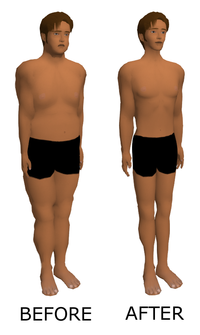
Photo from wikipedia
BACKGROUND Skipping meals is an increasingly common practice to lose weight among North American adults. However, the long-term effect of this practice on incident type 2 diabetes mellitus (T2DM) remains… Click to show full abstract
BACKGROUND Skipping meals is an increasingly common practice to lose weight among North American adults. However, the long-term effect of this practice on incident type 2 diabetes mellitus (T2DM) remains unknown. We assessed whether skipping meals to lose weight is associated with T2DM risk and whether this association is modified by cardiometabolic risk factors. METHODS Skipping meals to lose weight was assessed by questionnaire in 2,288 adults from the 1995 Nova Scotia Health Survey and was linked to administrative health databases to determine T2DM incidence in the following 23 years. Multivariable-adjusted Cox proportional hazards models estimated hazard ratios (aHRs) and 95% confidence intervals (CIs) for T2DM. RESULTS During follow up, 378 T2DM cases were diagnosed. Compared with participants who did not skip meals to lose weight, those who did (2.2%) had a 125% higher risk of T2DM (aHR, 2.25; 95% CI, 1.31 to 3.86). This association was no longer present after further adjustment for baseline body mass index (BMI) (aHR, 1.66; 95% CI, 0.96 to 2.85). Skipping meals to lose weight was associated with T2DM among participants who were men (n=1,135; aHR, 2.09; 95% CI, 1.09 to 4.02) or had a BMI <30 kg/m2 (n=1,676; aHR, 2.64, 95% CI, 1.15 to 6.06), elevated cholesterol (n=1,146; aHR, 2.11; 95% CI, 1.06 to 4.22), high blood pressure (n=1,133; aHR, 2.10; 95% CI, 1.10 to 4.01) and restless sleep (n=1,186; aHR, 2.19; 95% CI, 1.13 to 4.25), but not among women, those with a BMI of ≥30 kg/m2 and those without elevated cholesterol, high blood pressure or restless sleep. CONCLUSIONS Skipping meals to lose weight may be a predictive modifiable risk factor for developing T2DM over time, potentially working in connection with other T2DM risk factors.
Journal Title: Canadian journal of diabetes
Year Published: 2020
Link to full text (if available)
Share on Social Media: Sign Up to like & get
recommendations!